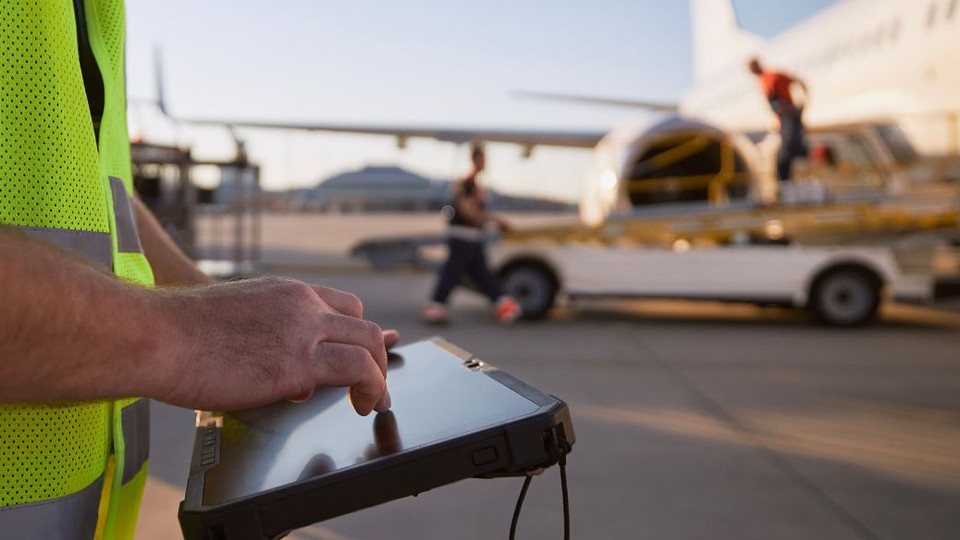Nov 28, 2023 Jan Uphues
ShareIn numerous sectors, aviation included, a significant shift is occurring, propelled by Artificial Intelligence (AI). Airlines, airports, and ground handlers are harnessing AI across various domains – from flight and crew scheduling, resource management, and traffic control to aircraft maintenance, cargo handling, enhancing passenger experience, and boosting overall operational efficiency. AI's prowess in analyzing vast data sets enables the detection of anomalies, prediction of equipment failures, and provision of actionable insights, fostering informed, real-time decision-making for more efficient, cost-effective, and sustainable operations.
A report by Allied Market Research titled “Artificial Intelligence in Aviation Market, 2023-2032” highlights the market's growth from USD 686.4 million in 2022 to a projected USD 4.04 billion by 2032, marking a compound annual growth rate (CAGR) of 20.5%. This surge underscores the need for responsible AI use and mitigation of potential misuse. Understanding AI's applications, drivers, and ethical deployment is crucial for aviation stakeholders.
DRIVERS OF AI IN AVIATION
The global pandemic starkly impacted aviation, prompting a reassessment of operations during the industry's downtime. Despite financial setbacks, the sector turned to technology for operational efficiencies and savings. The Allied Market Research report notes that in 2022, software solutions accounted for 58% of the AI aviation market, aiding in:
- Exploiting big data
- Enhancing operational performance and profitability
- Improving asset management
- Elevating customer service quality
Presently, AI's applications are multifaceted, including automating traffic control to diminish human error, optimizing flight crew scheduling, preempting delays for better customer service, directing passengers to services, aiding predictive aircraft maintenance and enabling dynamic ticket pricing.
Several carriers are proactively incorporating AI. For instance, British Airways optimized flight paths with AI in January 2023, saving an estimated 100,000 tons of fuel. Lufthansa employs AI to anticipate disruptive winds in Switzerland, while JetBlue and Etihad Cargo use AI for pricing forecasts and cargo operations, respectively. Azul Airlines applies AI for demand predictions and pricing strategies. Other airlines, like Delta Air Lines and American Airlines, are also leveraging AI.
AI-RELATED CONCERNS
While AI's advantages are evident, concerns persist, such as job displacement. However, the World Economic Forum predicts AI could create 97 million new jobs. A scarcity of AI expertise in aviation poses challenges, along with cybersecurity risks. Forrester reports that Chief Information Security Officers (CISOs) cite AI as a top cyber threat, with 80% of security leaders believing AI will amplify attack scales and speeds. Hence, the adoption of responsible AI practices is imperative.
INFORM´S RESPONSIBLE AI GUIDELINES
As a pioneer in AI applications, INFORM led an ethical AI focus group and formulated "Responsible AI Guidelines." Dr. Jörg Herbers, Co-CEO of INFORM, underscores the necessity of an ethical framework as AI becomes integral to our lives and enterprises.
The guidelines advocate for:
- Beneficial AI that enriches users and society while mitigating negative effects
- Human-centric AI that supports human work and decision-making
- Aligned AI that resonates with human and business values
- Privacy-preserving AI that adheres to GDPR and ISO 27001 standards
- Reliable AI that emphasizes consistency and transparency
- Safe AI that ensures security and addresses potential threats
Please find INFORM's “Responsible AI Guidelines” here.
From enhancing passenger experiences with personalized travel assistance to streamlining operations for a greener future, the impact of AI can be profound. But what exactly are the pivotal steps necessary to harness the full potential of AI applications? How can these advancements foster a more sustainable industry, and in what ways will travelers reap the benefits? Your insights are invaluable. Join the conversation and share your vision for AI's role in the evolution of aviation. Together, let's soar into a smarter, more sustainable tomorrow.
About our Expert

Jan Uphues
Marketing Manager
From the exhilarating rush of his very first flight, Jan Uphues was captivated by the world of aviation. Though that maiden voyage had its jittery moments, it set the course for a lifelong passion. Starting at INFORM in 2018, he combined it with his second love: crafting compelling content.


